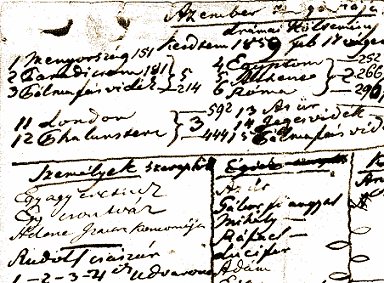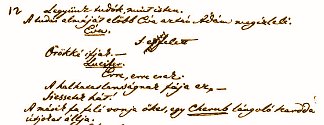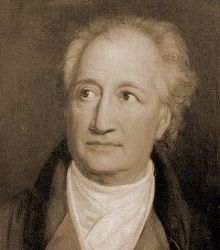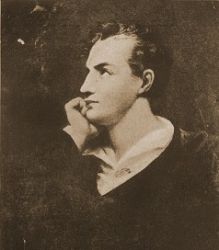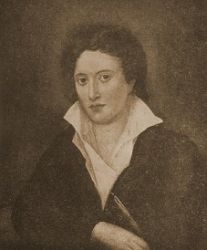Thoughts for the evaluation of the drama
Problems of Romanticism and the influence of ideas
|
The Romantic Movement was born of the inevitable realisation that the good and great ideas of the 18th century could not be realised and consequently was to defend and elevate above everything the autonomy of the personality. It reached its fullness in the admiration of productive man creating something that never existed before and thus rising to near deity, i.e. the genius.
The no longer than a lifetime's period in the progress of science and technology that spanned from the creation of the first organic compound (1828) until the publication of Darwin's evolution theses (1863) gave rise to new and difficult questions, in addition to the results and the answers it brought. The British landscape painter, William Turner depicted the steamboat struggling with the snowstorm, i.e. the battle of nature and technology, while the Hungarian Sándor Petőfi looked on the railway as the symbol of freedom. But while creative man (thanks to his talent) seemed to break away from the limitations of society, he had to face the determinist mesh of the laws of nature that had been just recently explored in more depth. The exactness of facts, their numerical nature and statistical describability pointed to 'positivism', the science of the measurable and this in turn had an impact on methodology and philosophy, too. And philosophy in turn raised at a higher level the questions that awaited answers from as early as the 18th century. Is there any development and progress? What is the role of the individual in the global processes? Are there everlasting ideas?
Before the revolution of 1848 Madách had read liberal works of historical philosophy that promoted the trust in existence, the belief in progress and optimism. The message was that life could be explored, understood and controlled. Hegel's philosophy of history had the greatest influence on the poet, because he considered it the most universal of them all: according to Hegel the progress of world history was nothing but freedom's rise to self- consciousness in man. Man would identify with the 'Absolute Spirit', and his creating, productive deification was the universal process of our existence. Nevertheless, Hegel's dialectics: the thesis - antithesis - synthesis theory in its pure form is missing from Madách's opus. (Béla Németh G.)
|
Although Madách does outline the struggle of opposites, his belief in progress has got shaken. This is because following the fall of the war of independence he began to read the positivist-materialist scientific works of his age.
As seen in Scene XII he was influenced by phrenology, the study of skulls (from among all the fashionable tenets of those days), according to which the construction of the skull determined man's personality and capabilities. And then the 'future society' advocated by a representative of utopian socialism is also drawn up in the same scene: Fourier's phalanstery. In Scene XIV one can discover a realisation of the antropia principles, according to which the Earth or civilisation itself would be destroyed as the Solar Energy is consumed. In Madách's concept of the world there was an all-determining realisation: man has to face its determination by nature. And the ending of the Tragedy shows the influence of Kant's philosophy: one can never get to know the world in its entirety, and the everlasting lesson that remains for Adam, too, is that of constant doubt and struggle.
The established literary genres proved to be insufficient for the artistic representation of these problems. The attempts at modernising the epic had not been successful and the traditional five-act structure of romantic drama and the stage techniques of the age would not allow the writer's imagination to soar freely, either. The genre of metaphysical lyric could not be expanded any more in terms of volume and versatility. The poet needed more freedom in his playing with space and time, great traditions and myths and a means of demonstrating his constant personal presence in his work and his interest in raising the ultimate, great questions and seeking the answers for them, he needed a free form allowing him to speak about the bearer, the object and the subject of all the problems he addressed, i.e. man himself. Madách was able to find the romantic artistic form that suited him, i.e. the dramatic poem, in which his hero could move in cosmic space and through the ages of world history in search of his life's meaning.
The place of the dramatic poem in world literature
The Tragedy of Man has been classified as humanity poem, lyrical drama or simply book-drama. The determinant component in the genre of dramatic poem is the noun 'poem', and the term 'dramatic' is only a distinguishing adjective within the larger genre. (Béla Németh G.) This is a complex, mixed artistic form, in which the features of the dramatic and the metaphysical lyric are intertwined.
Of course, as all other artistic forms, this one also has its precedents. The theme of God-man relationship could be traced back almost to the morality and mystery plays of the middle ages, or Dante's Divine Comedy. In 1835 the Polish Zygmunt Krasinski referred to his inspirational sources in his work's title Un-divine Comedy. But the same way, Milton's epic, Paradise Lost is also a forerunner for the Tragedy. But the school-defining great example for the dramatic poem was Goethe's Faust. It was upon the impact of this opus that the first great wave of humanity poems, i.e. Byron's Manfred, Cain and Shelley's Prometheus Unbound began rolling.
|
The literary works written in the second phase, i.e. in the 1850s and 1860s, demonstrate that this literary genre was suitable for conveying universal concepts. Following the events of 1848-49, the all-European crisis of liberalism, then the failure of the 'peoples' spring' that had promised fast progress, and drawing from all this experience, the Legend of Centuries (1859) was born in Victor Hugo's workshop almost simultaneously with the Tragedy, and a few years after Madách's death the last and greatest of these works, Ibsen's Peer Gynt (1867) was written.
A distinction is often made in literary history between the Faustiads, i.e. epics focusing on a single hero within a mythic-symbolic framework and the more epical French version: the so-called humanity poems, in which the hero is re-born in various shapes over the sequence of relatively independent historical episodes. Madách's opus can be positioned in the cross-section of these two trends of world literature, uniting and making good use of the possibilities existing in both sub-categories.
More recently this dramatic poem has been thought of as a two-level drama, because the conflict develops vertically, between the upper and lower levels of the drama, instead of horizontally, i.e. in the interrelation of the players. (Tamás Bécsy) One level is the upper world with its cosmic forces and the other one is the lower or earthly level that has its own rules. The lower level is the world of humans, the scene where things happen, but the conflicting powers of the upper level (the Lord and Lucifer) want to have control over man. (Pál Varga) This is the dramatic form that enabled Madách to project his internal dramatic debate: What is the purpose and meaning of man's life? Is there a free will? Is there progress and advancement? Etc.
Precedents in Hungary
Many have considered the Tragedy of Man a stand-alone opus. But there is a series of works written in the search of the meaning of human life and man's deeds that represent the most valuable trend of metaphysical lyrics, epics and dramas written in verse in the reform era. An imaginary list of authors addressing such issues would include Ferenc Kölcsey, Mihály Vörösmarty, Zsigmond Czakó and Sándor Petőfi. Only those who have a strong belief in something, who have fully dedicated their life to a single idea or a set of ideas, are able to really think, doubt and become desperate. Poems like Kölcsey's Vanitatum vanitas (1823), Vörösmarty's play: Csongor and Tünde (1831), and his poems: Thoughts in the Library (1844), The People (1846), and Zsigmond Czakó's long-forgotten, weird drama, Leona (1846), Petőfi's Clouds cycle (1845-46), and The Apostle (1848) are all works that demonstrate to us the continued presence of the questioning-contemplating poetic attitude in Hungarian poetry.
|
But 1849, the fall of our war of independence was needed to make the questions raised occasionally in poetry in the reform era a really fundamental problem, the problem of the future fate of the Hungarian nation, i.e. the nation that for a short time had taken the lead in global progress. Vörösmarty's rhapsodies, János Arany's The Gypsies of Nagyida (1850), Zsigmond Kemény's novels and essays, János Vajda's pamphlets, and István Széchenyi's legacy of his notes in Döbling are all clear manifestations that this generation of Hungarian literacy indeed dared to face the question of 'what are we in this world for?', i.e. the question reformulated after the Hungarian freedom fighters' capitulation at Világos.
